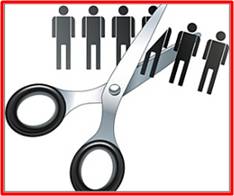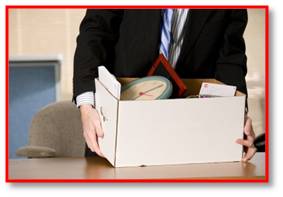Monday Author: Susanne Skinner
 Every job is a temporary job. In today’s work landscape we recognize employment is subject to change without notice. Sometimes you see it coming, sometimes you don’t. I’ve generally been able to feel it coming. It begins with a disturbance in the force. There are tangible signs of unrest, especially at the management level, followed by rumors and an undercurrent of fear. Change is coming.
Every job is a temporary job. In today’s work landscape we recognize employment is subject to change without notice. Sometimes you see it coming, sometimes you don’t. I’ve generally been able to feel it coming. It begins with a disturbance in the force. There are tangible signs of unrest, especially at the management level, followed by rumors and an undercurrent of fear. Change is coming.
When it comes it shakes us to the core. New management brings reorganization. Lower than expected profits dictate a reduction in the work force and scaled-back development. In most cases it is not a reflection of your work, but a realignment of the company strategy. There are only two ways to right size a company—people and programs.
Being laid off and seeing colleagues laid off will happen to all of us. You never get used to it. There’s a myth out there that layoffs are rationally determined and reflect the need to review and release “fails-to-meet-requirements” performers. The truth is layoffs are seldom done this way.
Very few organizations use a layoff as a chance to weed out poor performance. Once the decision has been made to improve financials or scale back programs, layoffs are done as quickly as possible. This may result in the loss of poor performers, but it also causes some of the best to be forfeited, along with in-between people who are reliable and good at what they do. Layoffs rarely make sense, and never provide a viable or long-term growth strategy.
The Scalpel and the Ax
People are usually laid off because they are in the wrong place at the wrong time in an organization that needs to reduce expenses. Larger companies can afford to do this on the down low, a little at a time. Smaller layoffs side-step an SEC filing (if you are public) and dodge the negative press and social media postings that accompany them. Small companies never have that luxury. When you work in a small company it is see and be seen. Layoffs are done quickly and visibly—especially in an open-plan office.
 Layoffs hurt morale, reduce confidence in yourself and others, and generate survivor guilt for those who remain. Watching colleagues pack their belongings and walk out the door is hard and everyone feels uncomfortable. What do you say? Where do you look? A manager who sleeps well the night before a lay-off needs a reality check and a new career path.
Layoffs hurt morale, reduce confidence in yourself and others, and generate survivor guilt for those who remain. Watching colleagues pack their belongings and walk out the door is hard and everyone feels uncomfortable. What do you say? Where do you look? A manager who sleeps well the night before a lay-off needs a reality check and a new career path.
Why Do it?
- Employees are the largest cost to an organization
Commissions, bonuses , benefits, taxes and other overhead costs add a 35% increase to an employee’s base salary. Layoffs provide an immediate fix to profitability by eliminating these costs.
- Employees are fixed costs
Employees are costs that don’t change regardless of the scale of work being done. When revenue drops, employee costs increase and profits decline. When you don’t make your numbers, the best way to improve profit is by reducing head count. It is the go-to fix.
Layoffs are a short-term solution. They are symptoms of bigger organizational problems that, if not addressed, result in a lights-out-everybody-go-home layoff.
It’s Not About You
But it is about you. That’s the paradox. If you were vital to the organization you would still be there. A layoff tells you that you are not needed. It dissolves your relationship with the company and reduces your value to a severance package. Relationships developed at work rarely survive a layoff. Once you or your colleagues leave it is unusual to hear from each other or continue your friendship.
Employers focus on loss of market share or a dismal quarter. They have little regard for terminated employees who must go home and tell their families they no longer have a job. Managers do not concern themselves with how hard it will be or how long it will take to find another job. They deliver the bad news and turn it over to HR to tie up any loose ends.
 The psychological cost of being laid off is high. The emotional and economic consequences can be sizable. Do not allow it to make you feel like a failure. A layoff does not speak to your abilities; it speaks to failure in the management of the organization. Employees bear the brunt of these failures. Markets fluctuate, technologies wax and wane, but people are still the most important element in any successful business.
The psychological cost of being laid off is high. The emotional and economic consequences can be sizable. Do not allow it to make you feel like a failure. A layoff does not speak to your abilities; it speaks to failure in the management of the organization. Employees bear the brunt of these failures. Markets fluctuate, technologies wax and wane, but people are still the most important element in any successful business.
Talented and passionate employees are in high demand, even in a down economy. One company’s loss is another company’s gain. Prove it by how you respond to being laid off. Do not take it personally or allow yourself to be defined by a job. Get back out there and revel in the best kind of revenge—getting a new job.
I have walked through this fire twice. The first time I was in a job and company that was a hot mess. Being laid off was the jump start I needed to move on. The second time was just over three years ago. There was executive turnover followed by the loss of my manager. The new manager’s primary objective was to copy another company’s web site and remove legacy employees. Even though the loss of my job was predictable, it was still devastating.
A layoff forced me to leave the best job I’ve ever had and that turn of events led me to the best job I’ve ever had. Funny how that works.
